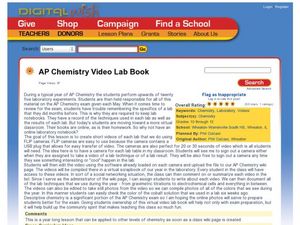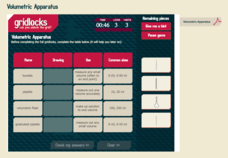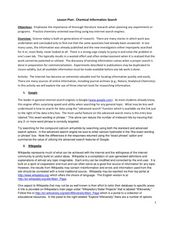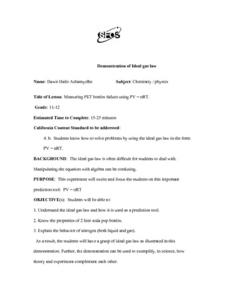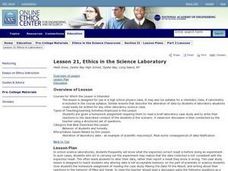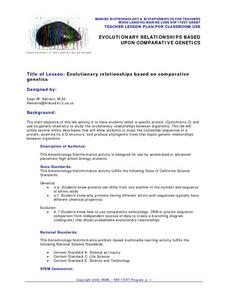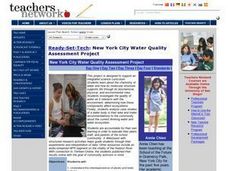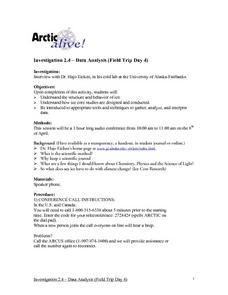Curated OER
X-ray Spectroscopy and the Chemistry of Supernova Remnants
This link takes you to a comprehensive unit that delves into emission spectra and supernovas. There are four parts: How and where elements are created, electromagnetic radiation, spectroscopy, and the newest technology for studying our...
Royal Society of Chemistry
Apparatus Diagrams 2
Ready to heat things up in the lab, but your class doesn't know its way around a Bunsen burner? Scholars get familiar with heating apparatuses through a series of puzzles designed to promote vocabulary and reasoning skills. The activity...
Curated OER
AP Chemistry Video Lab Book
Students develop a video lab book. For this web-based activity, students use flip cameras and the Web to create a video lab book of the labs they conducted through out the year. This will enable them to be better prepared for the AP exam...
Curated OER
Soil Sample Lab
High schoolers test the pH of soil samples they collected from the field trip. In this chemistry lesson, students differentiate acids and bases. They write a lab report about the experiment.
Royal Society of Chemistry
Halide Ion Tests
Young chemists love it when colorful solid products appear in a reaction vessel! Scholars discover the products that form during halide ion tests through a hands-on activity. Users go online and apply chemistry knowledge and reasoning...
Royal Society of Chemistry
Volumetric Apparatus
Can your class tell the difference between a burette and a pipette? Develop their lab apparatus knowledge using a series of puzzles. The online activity associates the name, image, and sizes of burettes, pipettes, volumetric flasks, and...
Royal Society of Chemistry
Hazard Symbols
Starting in 2015, all chemicals must have a pictogram of the associated chemical hazards. A brain-building activity reviews four of the basic symbols found in a typical science laboratory. Through a fun puzzle, scholars apply their...
Royal Society of Chemistry
Forensic Tests
Flame tests determine if there is a specific metal in a chemical compound. Young forensic scientists review their understanding of flame tests and hydroxide precipitates by solving puzzles. The timed review encourages mastery.
Curated OER
Chemical Information Search
Students research information using various internet resources. In this chemistry lesson, students demonstrate their ability to navigate websites and gather necessary information. They evaluate the potential usefulness of the databases...
Curated OER
Hess's Law
Pupils solve chemical equations. In this chemistry lesson, they balance chemical equations after completing a lab. They can use a TI for this assignment.
Curated OER
Demonstration of Ideal Gas Law
You know that liquid nitrogen turns into a gas at room temperature. Place some in a two-liter bottle for a physics demonstration of the ideal gas law. Beware, however; this is a dangerous demonstration! Not to mention that you may not...
Curated OER
Ethics in the Science Laboratory
Learners consider the role of ethics in science lab procedures. In this ethics lesson, students explore a scenario that requires them to record their reactions to the case and the conduct of learners in the case who alter laboratory data.
Curated OER
Lesson 2, Student and Teacher Behaviors in Science
Students explore ethics. In this science ethics lesson plan, students examine science lab classroom ethics as they consider various scenarios that encourage authentic student discussion and the formulation of guidelines and principles.
Curated OER
Evolutionary Relationships Based Upon Comparative Genetics
Students investigate the protein cytochrome c in an attempt to use its genetic chemistry to study possible evolutionary relationships between organisms. The lesson integrates technology with the use computers to perform DNA analysis.
Curated OER
Polymers
Students explore online tutorial on polymers. For this chemistry lesson, they create two polymers in the lab and compare their properties. They write a sales letter about their new and improved polymer product.
Kenan Fellows
Unit 3: Genetic Variation
What happens when genes change? Junior genetic investigators examine the effects of mutation in the third unit of a four-part Biotechnology series. Individuals discover the types of mutations through a series of PowerPoints, then partner...
Curated OER
New York City Water Quality Assessment Project
Students investigate the chemistry of water and how its molecular structure supports life through its biochemcial, physical, and environmental roles. They investigate the quality of water as it interacts with the environment. Students...
Curated OER
How Do I Get a Pure Sample of the Molecules I Make?
Students initially engage in online research and consult print materials to identify a compound to produce. Once a selection has been made, individually, students conduct lab experiments to isolate substances. The end product is a...
Curated OER
The Energy Debate - Energy of Peanut
Students articulate the difference between the terms heat and temperature. They calculate the amount of energy associated with a given temperature rise and design an experiment to measure the energy of a fuel.
Curated OER
The Biofuel Project: Creating Biodiesel
Students research about the processing of biodiesel fuels. In this energy instructional activity, students produce their own biodiesel using used and new vegetable oil. They discuss the environmental and economic benefits of using...
Curated OER
The Exceptional Nature of Cellulose
Students observe the affects of a substance's composition and structure have on its solubility. In this cellulose lesson students compare the amount of energy required to dissolve mono-saccharides with that required to dissolve...
Curated OER
Einstein's BIg Idea
Students discuss what the m in E=mc2 represent. They relate that mass in a chemical reaction is always conserved. Students convey that atoms rearrange themselves in chemical reactions to form different molecules and compounds.
Royal Society of Chemistry
Royal Society of Chemistry: Gridlocks: Level 1
A collection of grid puzzles that cover topics in basic chemistry, including acids, salts, alkalis, chemistry lab equipment, the periodic table, states of matter, and more. These are excellent for topic review and reinforcement. The...




